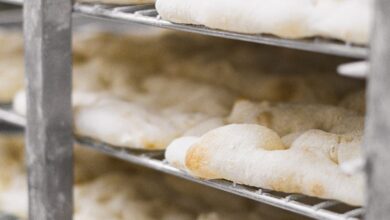How to Pick Durable Rolling Pins
When it comes to baking, a rolling pin is an essential tool that can make or break your culinary experience. A high-quality rolling pin not only helps you achieve the perfect dough thickness but also stands the test of time. With a plethora of options available, how do you choose a durable rolling pin that suits your needs? Here’s a guide to help you navigate the world of rolling pins and select one that will last for years.
Types of Rolling Pins
Understanding the different types of rolling pins is crucial in making an informed decision. The two most common styles are the classic French rolling pin and the pin-style rolling pin.
French rolling pins are tapered at both ends, allowing for a greater range of motion and control. They are typically made from hardwood, which adds to their durability. The absence of handles gives you the freedom to roll dough more evenly, making them a favorite among professional bakers.
Pin-style rolling pins have handles on either end, which can provide more leverage when rolling out thicker dough. They often come in materials like plastic, silicone, or wood. While they can be easier to handle for some tasks, their durability can vary based on the material used.
Material Matters
The material of your rolling pin plays a significant role in its durability. Common materials include wood, marble, silicone, and stainless steel.
Wooden rolling pins are popular for their traditional feel and effectiveness. Hardwoods such as maple or cherry resist warping and cracking, making them long-lasting choices. Marble rolling pins offer a unique aesthetic and are excellent for keeping dough cool, but they can chip or crack if dropped.
Silicone rolling pins are lightweight and non-stick, making them easy to clean. However, they may not provide the same heft and durability as their wooden counterparts. Stainless steel rolling pins are robust and often feature a sleek design, but they can be heavy and may stick to some doughs if not floured properly.
Size and Weight Considerations
Selecting the right size and weight is crucial for comfort and control. Rolling pins come in various lengths, typically ranging from 10 to 20 inches. A 15-inch rolling pin is versatile for most baking tasks.
In terms of weight, a heavier rolling pin can make rolling easier, as gravity assists in flattening the dough. However, if you prefer a lighter option, ensure it still feels sturdy in your hands. Test various weights in the store to find the perfect balance for your baking style.
Finish and Care
The finish of your rolling pin affects not only its durability but also its maintenance. A well-finished wooden rolling pin should feel smooth to the touch and free of splinters. Look for pins that have been treated with food-safe oils, as these will be less prone to absorbing moisture and odors.
Care is vital for longevity. Wooden pins should be hand-washed and dried immediately to prevent warping. Avoid soaking them in water and never place them in the dishwasher. Silicone and stainless steel rolling pins are generally easier to clean and can often be placed in the dishwasher, but always check the manufacturer’s guidelines.
Finding the Right Fit
Choosing a rolling pin that feels comfortable in your hands is essential for effective baking. Visit a kitchenware store to test different models. Pay attention to the grip: it should feel natural and allow for easy maneuvering. A rolling pin that feels clumsy or awkward can lead to frustration during the baking process.
Beyond the feel, consider your baking habits. If you frequently make large quantities of dough, investing in a larger, heavier rolling pin may be worthwhile. For occasional bakers, a smaller, lighter option could be a perfect fit.
Long-Term Investment
A durable rolling pin is not just a tool; it’s an investment in your baking journey. Opting for quality over price can save you money in the long run. A well-chosen rolling pin will enhance your baking experience and may even become a cherished family heirloom passed down through generations.
By considering the type, material, size, and care of your rolling pin, you can confidently select a durable option that meets your needs. Happy baking!







